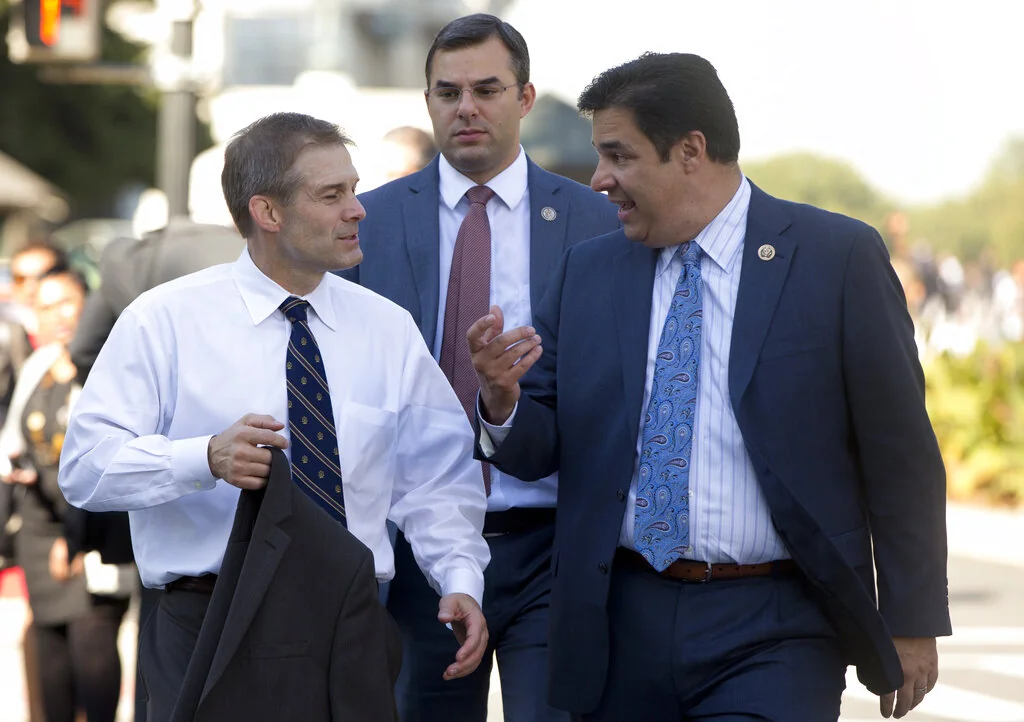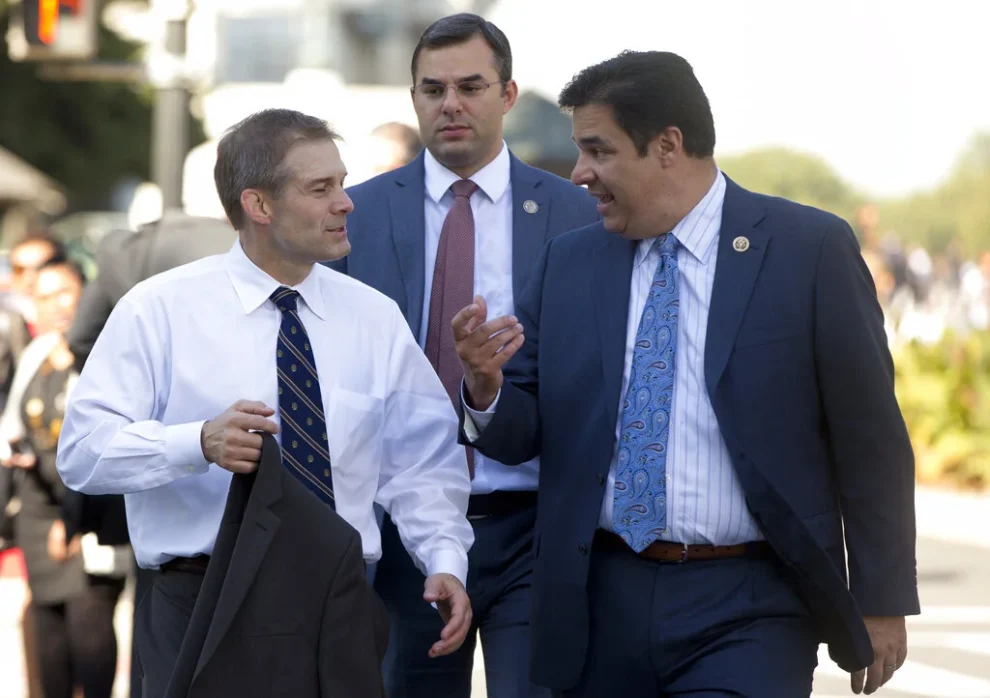Since its founding 10 years ago, the Freedom Caucus has been called disruptors, extremists, “hardliners,” and a loud minority within the House Republican conference. But the GOP trifecta, paired with a new speaker and fresh blood, has transformed the caucus as a voice for the conservative establishment and a whip for President Donald Trump’s agenda.
In January 2015, nearly a dozen GOP lawmakers founded the Freedom Caucus as a place to discuss policy and conservative values to ultimately refine the way the right flank interacted with senior members.
The “smaller, more cohesive, more agile, and more active” caucus, as then-Chairman Jim Jordan (R-OH) called it at the time of its founding, was not intended to serve as yet another GOP rebellion. But in the 10 years since its founding, the Freedom Caucus has been at the center of party infighting over controversial legislation and compromises with Democrats, often stalling congressional procedures until they get their concessions.
“The House Freedom Caucus was born out of a frustration with overall House leadership and ensuring that there was ample participation by members of the entirety of the body, everybody having a voice and being able to try to shape what we’re doing,” Rep. Chip Roy (R-TX) told the Washington Examiner.
Over the last few years, caucus members have played a role in delaying key votes, ousting a speaker, and holding up the floor to nix fellow GOP lawmakers’ bills.
But that wasn’t always the MO of the Freedom Caucus.
“I joined and wanted to be a part of founding the Freedom Caucus as a place where it was more like a think tank,” Rep. Marlin Stutzman (R-IN) told the Washington Examiner. “We thought through policy. We thought through strategy.”

Starting as a group of a dozen, the caucus now boasts a membership of 30 to 40 Republicans. Famous for keeping their exact numbers and names a secret, most don’t know who, exactly, is a Freedom Caucus member. Some lawmakers are vocal about their membership, while others are discovered by their attendance at a rare caucus-led press conference or bolstering from the caucus’s social media.
Roy, who joined Congress in 2019 and now serves as caucus policy chairman, said he thinks they are “at least as strong as we’ve ever been, if not stronger.”
“It would be hard for me to say that now, 10 years hence, that the Freedom Caucus isn’t very much in stride having an insignificant voice, not an outsized, I think, an appropriately significant voice in the conversation because of the work we’ve done and tried to work with our colleagues,” he said.
Freedom Caucus operated under a very different House in 2015 than 2025
President Barack Obama was in office when the Freedom Caucus was born, fresh off the Tea Party grassroots movement that ushered in more fiscally conservative Republicans. At the start of the 114th Congress in 2015, Republicans controlled both chambers for the first time since the 109th in 2005.
Republicans also held 248 seats in the House at the time, giving GOP leadership a significant buffer within their ranks as they contended with both budget hawks and centrist Republicans representing purple districts who saw a benefit in working with their Democratic president. Similarly, in Trump’s first term in the 115th Congress, House Republicans held a wide 241-194 majority.
When newcomer Trump demolished the GOP primary field and shocked the world by becoming president, his brash, unconventional ways didn’t always align with the more establishment Republican House, led by then-House Speaker Paul Ryan (R-WI), the running mate to 2012 GOP nominee Mitt Romney.
Trump, however, built inroads in the House through the more rebellious Freedom Caucus group.
“We’re his No. 1 supporter,” Rep. Andrew Clyde (R-GA) said of the Freedom Caucus’s alliance with the president that has only grown over time.
“We know that the ‘Make America Great Again’ agenda, the ‘America First’ agenda, is the right agenda,” Clyde added. “But we have to do it in a fiscally responsible way, which the president has called for, and we’re going to hold the House to that.”
During his first term, two of his chiefs of staff were Freedom Caucus members: former Republican Reps. Mick Mulvaney, who served in an acting basis, and Mark Meadows.
In 2025, the GOP trifecta is back for the first time since its brief stint from 2017-18, during which Republicans passed significant legislation like the 2017 Tax Cuts and Jobs Act. For some members, it’s deja vu, as Republicans are working through reconciliation right now to extend the tax cuts.
But this trifecta comes with a glaring difference: Speaker Mike Johnson (R-LA) holds just a three-seat majority, making it incredibly difficult to pass contentious legislation without the support of both centrist GOP lawmakers and staunch fiscal conservatives.
Stutzman was a founding HFC member who was in Congress from 2010 to 2017. Back in Congress after an eight-year absence, he thinks a razor-thin majority works in the Freedom Caucus’s favor, as it forces leadership to take their opposition seriously.
“Having a small majority is also a difference maker, because you don’t want to lose one vote, and so you have to have everybody,” Stutzman said. “I think that’s actually beneficial to the conference, because if you have too big of a majority, it’s easy to say, ‘Oh, you know what? We’re just gonna ignore those guys.’”
But many Republicans attribute the Freedom Caucus’s growing power to Johnson himself.
Former Speaker Kevin McCarthy and rebellious Republicans often butted heads during his time leading the conference, and many blasted him for “side deals” that he made with Democrats. One particular spending deal ultimately led to McCarthy’s historic ousting, with eight Republicans — some current and past Freedom Caucus members — voting with all Democrats to remove him.
In his place, after three months of chaos, came Johnson. Considered to be more ideologically conservative thanks to his faith and background as a constitutional lawyer, House Freedom Caucus members rallied behind Johnson as someone they felt would allow the caucus a seat at the table in ways McCarthy never did.
That’s not to say the support behind Johnson is ironclad. When it came time in January to vote for Johnson as speaker again, Freedom Caucus Reps. Keith Self (R-TX) and Ralph Norman (R-SC) voted against Johnson initially. But after a conversation with Trump and other allies, Self and Norman flipped their votes. Rep. Thomas Massie (R-KY), who is not in the caucus, was the sole “no” vote.
Norman said it’s easier for the Freedom Caucus to exert their will because they find Johnson more amenable than McCarthy.
“With Kevin McCarthy, we didn’t have a chance because he’s the one that had the side deals. He’s one that you couldn’t rely on,” Norman told the Washington Examiner. “Mike, it’s like nailing jello to a wall or herding cats to get everybody because we all come from different states, different constituencies, but we’ve been a voice that has been a consistent voice.”
“With the slim majority, we pretty much control — it’s not just one, two, three of us. We got 18 to 20 of us, and we stick together,” Norman added.

So, is the Freedom Caucus, once a vocal minority and thorn in the side of leadership, transforming into the microphone of the establishment? Some members say it depends.
Since Trump took office, Freedom Caucus members have met with the president or his officials a handful of times, either at Mar-a-Lago or at the White House, to discuss strategies for the budget reconciliation process that will codify Trump’s agenda in one megabill.
The president and the Freedom Caucus have been in lockstep since January. Known as rabblerousers, the Freedom Caucus found a kindred spirit in Trump, who has been heralded as the only man who can “drain the swamp” of Washington and bring back the “Golden Age of America.”
“It’s a pretty good day if we’re being considered establishmentarian, if we’re working alongside President Trump, who has pretty much been a pretty good wrecking crew when it comes to the swamp that we’ve been trying to fight for years,” Roy said.
Still, the caucus gets slapped with an “ultra conservative” label from some media outlets or fellow lawmakers, but Chairman Andy Harris (R-MD) said he laughs it off or, at times, takes pride in it.
“It’s almost the water off the duck’s back now, because it happens so often,” Harris said of the monikers. “We’re used to it. We are conservative, and we make no bones about it.”
Though the caucus is overwhelmingly backing the president, that support isn’t impenetrable.
“When the president is moving in a conservative direction, we will support him 1,000%, and if he doesn’t move in that direction, we will hesitatingly, but clearly disagree with him,” Harris said.
Freedom Caucus causes ‘headache’ for conference…and its own members
The Freedom Caucus has seen high-profile shake-ups in its ranks over the last two Congresses, with some being voted out and others voluntarily leaving after infighting and a loss of appetite for the caucus’s hardball approach.
In 2023, Rep. Marjorie Taylor Greene (R-GA) became the first Freedom Caucus member to be ousted from the group. Her removal came after she got into the infamous spat with Rep. Lauren Boebert (R-CO), also a caucus member, as well as votes on legislation that contrasted with the views of the caucus.
Four people left the Freedom Caucus in 2024.
Rep. Bob Good (R-VA) became the first House Freedom Caucus chairman to ever lose reelection after Rep. John McGuire (R-VA) defeated Good in the primaries. The dynamic of the caucus, staunchly pro-Trump for several years, had shifted under Good’s leadership after the former congressman endorsed Gov. Ron DeSantis (R-FL) for the GOP presidential nomination.
In March, Rep. Randy Weber (R-TX) was kicked out of the caucus after he and Good met over his sparse attendance at meetings. In the conversation, Weber said he hadn’t lost interest in the caucus but disliked the “burn the house down” procedural tactics the right flank had become known for. In response, Good told him to reapply for admission to get back into the caucus.
“It was a shock because I’ve disagreed with some of the Freedom Caucus chairs … but I’ve never had them tell me you need to get out of the Freedom Caucus,” Weber told the Texas Tribune at the time.
The caucus lost two members in one night in July last year. Rep. Warren Davidson (R-OH) was ousted from the Freedom Caucus due to his endorsement of Good’s challenger. Because Davidson was ousted, Rep. Troy Nehls (R-TX) decided to voluntarily resign from the caucus’s ranks, blasting the group for going against what he believed was the caucus’s mission to grow the group and encourage more members with conservative values to join.
Jordan, who served as the first chairman of the caucus, said removing Davidson was a “big mistake.”
When asked about whether the Freedom Caucus is straying from its original mission, the Ohio Republican told the Washington Examiner at the time, “I have concerns.”
The departures didn’t end with the new year. Last month, Rep. Anna Paulina Luna (R-FL) decided to leave the caucus after a group of Freedom Caucus members threatened to hold up floor proceedings unless Johnson and other House leaders killed her bill allowing for proxy voting for new parents.
“I cannot remain part of a caucus where a select few operate outside its guidelines, misuse its name, broker backroom deals that undermine its core values and where the lines of compromise and transaction are blurred, disparage me to the press, and encourage misrepresentation of me to the American people,” she said.
Luna told the Washington Examiner she is supportive of the caucus’s “founding principles” and still has many friends within the coalition “and I actually miss them dearly.”
“But I do think that, you know, there are a few that aren’t the best negotiators and aren’t the brightest bulbs, and they tend to bring a lot of headache for the rest of them,” Luna said.
Harris said the caucus is boasting a strong freshman class, with several members pointing to young lawmakers like Rep. Brandon Gill (R-TX) as the future of the movement.
THE FOUR FACTIONS SPEAKER JOHNSON MUST PLEASE TO PASS TRUMP’S BUDGET MEGABILL
“We were successful in moving the conference in the conservative direction, reminding the conference of its conservative roots,” Harris told the Washington Examiner. “And I think as you do that, and you are willing to, when the conference moves your way, you’re willing to get to a yes, I think that’s a measure of success, in my mind.”
“And if that’s a measure of success, we’re more successful.”
Marisa Schultz contributed to this report.
























